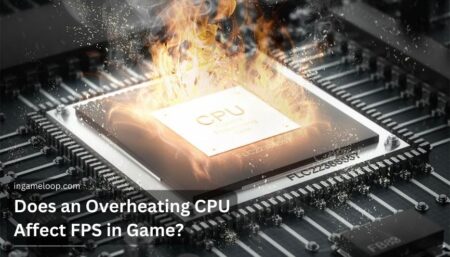The gaming industry began in the late 1970s and early 1980s when they created some simple arcade games like Pong and the very first home console. With the evolution of games, they have become quite heavy, and nowadays, almost every new game offers an endless buffet of realistic feel, providing perfect entertainment. When building a new gaming system, you must focus on selecting many PC components to complete the project. But the most important ones out of several are the graphics card and processor.
Well, the processor or central processing unit (CPU) would be our main focus in this article. This is because if you know what a CPU does for gaming, things become pretty handy. You can choose a perfectly suitable processor for your system, usage, and gaming requirement. Moreover, if you think that finding a suitable CPU that can work according to your preferences and expectations might be a rigorous task these days, this post is for you. Read this post until the end to look at the function of a CPU for gaming.
Key Takeaways
- The CPU is the central processing unit of the computer, which performs calculations and instructions for various programs and processes, including games.
- The CPU is responsible for running the game logic, such as the physics, AI, input, sound, and network, as well as communicating with the GPU and other components.
- The CPU is also responsible for loading and unloading game assets, such as textures, models, and animations, from the storage device to the RAM and GPU memory.
- The CPU can affect the gaming performance, such as the frame rate, resolution, and graphics quality, depending on the game’s optimization and demand.
- The CPU can also cause bottlenecking, which is when the CPU is too slow to keep up with the GPU, resulting in lower frame rates and wasted GPU potential.
What does a CPU do for gaming?
It’s essential to understand the basics first to know better the actual operation and importance of a processor for gaming. For that, we must first understand the operation of a graphics card, or GPU, to climb the ladder. A GPU, or graphics card, is the most crucial computer component for gaming since it processes game-related data sets and computes the instructions. But even before that, the CPU receives those data sets from the RAM, passes those to the graphics card, and then, the GPU processes that data as it’s its duty.
In short, the CPU transmits the actual game-related data to the GPU and keeps supervising it to perform as per the needs. So, the processor doesn’t actually process the data, but instead gives it to the graphics processing unit to process it. Does it mean that a CPU doesn’t play any role in gaming? Well, it does play an important role in gaming, but indirectly. Since a GPU can’t work alone processing those hefty data sets, a CPU comes into action and helps the graphics card by guiding it to perform certain actions. In short, a CPU plays a massive role in gaming, but as a supervisor.
The caliber of both the graphics card and processor must be equal if you want to get the most out of your gaming system. You must have heard about the term bottlenecks. A PC bottleneck is a situation when one computer element limits the performance of other components, causing a lag in the overall performance. Therefore, both the CPU and GPU must be of the caliber to avoid bottlenecks. For the sake of this post, we will look at all the processor factors that can directly impact the overall system’s performance. Let’s uncover!
CPU speed
CPU is the brain of the computer; the faster the CPU, the higher the gaming performance will be. It means having a gaming CPU is very much necessary for getting a realistic experience. So no wonder that gaming will depend on your CPU speed. The speedier the CPU, the more prominent the gaming will be! In truth, in case your amusement slacks in between the recess, your CPU is totally mindful of this event.
Core count
The performance your CPU will have on your recreations depends on the number of cores your CPU has got to offer. By and large, the more cores, the superior the performance will be. But 4-6 cores are sufficient for cutting-edge mid-tier gaming very quickly. If not, you may confront a parcel of slacks, particularly once you attempt to play massive recreations. That’s why it is suggested that you need to have a strong CPU for intensive gaming.
Input latency
Since online gaming requires speedier input-output inactivity, having speedier input latency will enable you a competitive advantage against your competitor gamers. Your CPU is mindful of these input-output activity errands. This way, having a quicker CPU will give you an edge against adversaries. A CPU with a 3+ GHz clock speed is perfect to start playing games since it comes with minimum input latency.
Compatibility with GPU
Having an adjusted framework is critical for getting ideal outline rates in-game. If your GPU happens to be quicker than your CPU, it’ll cause a bottleneck which can adversely influence your gaming execution, suggesting you may be getting less execution than your GPU is able of. Hence, ensure to match the compatibility and performance of both the graphics card and processor for better gaming overall gaming experience.
Which CPU is perfect for gaming?
The leading CPU for gaming implies the speediest chip, with enough cores but in your cost range. Having more cores means that you just can run hungry games at better graphics resolution, an improved FPS without getting strained, and a three-digit refresh rate. But again, which CPU is perfect for gaming? Well, there are mainly two CPU brands, Intel and AMD, capturing the whole tech market. Both brands manufacture all types of processors for gaming, starting from the basic ones to the top-tier gaming processors with 12+ CPU cores.
For your information, AMD has improved the multithreaded performance of its processor over the last few years. These could be perfect for video editing, streaming, 3D rendering or animation, and other purposes requiring adequate multithreaded computing power. On the other hand, Intel is well-known for top-tier CPU speeds and efficiencies in all types of workloads. As per my experience, I have been using and testing Intel processors for gaming. Therefore, you can go for the Intel family if you want to build a gaming system.
Conclusion
A CPU takes the game-related data from the RAM, passes it to the GPU, and supervises the graphics card to execute the instruction. The processor doesn’t play any role in games but acts more likely as a controller guiding the graphics card to perform certain operations. At the same time, it plays a vital role in the overall gaming performance of a system. Suppose you have a low-tier CPU paired with a good-quality GPU. In such a case, your system won’t perform well and will cause bottlenecks affecting the PC utility.
Frequently Asked Questions
Which is more important for gaming: CPU Or GPU?
Both the processor and graphics card are essential for gaming. Additionally, both must be of the same caliber to get the most out of a gaming rig. But why? Well, the relationship between CPU and GPU is like a relationship between horse and rider—both must equally matter in a race to win. Just like that, a CPU doesn’t directly process the games’ data like a ride or instructions but instead supervises the GPU to compile these data sets as the rider does.
How does CPU affect FPS?
A CPU is like a supervisor in a computer, guiding the graphics card to perform certain tasks while gaming. It passes the gaming instructions to the GPU that executes and shows visuals on the monitor. Suppose there is a low-speed CPU in your system. In such a case, it will take much more time than what is necessary to pass the instruction to the GPU. So the card won’t be able to showcase enough resolution, fps, and refresh rate. This is how a CPU affects FPS while gaming.
Will upgrading the CPU improve performance?
Suppose you upgraded your older CPU with a new one with more cores, a higher number of threads, and better clock speeds. In such a case, upgrading the CPU will definitely improve the PC’s overall performance. However, you must also consider the other factors, components, and aspects as well. An equally performing GPU and motherboard must keep everything flowing well. Otherwise, bottlenecks may happen that may ruin the overall performance.



![Is an Intel Celeron Processor Good? [2024]](https://www.ingameloop.com/wp-content/uploads/Is-an-Intel-Celeron-Processor-Good-450x257.jpg)



![What CPUs are Compatible with my Motherboard? [2024]](https://www.ingameloop.com/wp-content/uploads/What-CPUs-are-compaitble-with-my-Motherboard-450x257.jpg)